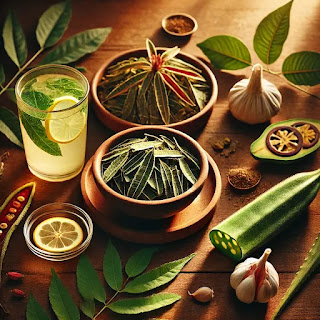The Herbal Elements That Shaped My Everyday Life
The Herbal Elements That Shaped My Everyday Life
Growing up in Zimbabwe, the rhythms of my childhood were infused with the rich scents and flavors of nature’s own medicine cabinet. My grandmother, a woman of deep wisdom, always believed in the power of herbs. She never let a day go by without infusing our teas, porridge, or even our simple everyday meals with plants that carried generations of healing knowledge. These weren’t just ingredients to her; they were remedies, little miracles passed down from ancestors who understood the quiet power of nature. And so, to this day, I find myself drawn to these herbs—some out of habit, some out of nostalgia, and some because, quite simply, they work.
One of the first herbal elements that became a staple in our home was ndorani. My grandmother swore by it, adding it to our porridge or tea, not just for its earthy, grounding taste but for its ability to soothe and heal the stomach. Whether it was a simple stomachache, an infection, or just general discomfort, ndorani was the trusted remedy. To her, it was more than just a herb; it was a guardian of our well-being. Even now, whenever I feel a hint of digestive trouble, I find myself reaching for ndorani, reliving those moments of childhood care wrapped in a warm bowl of porridge.
Then, of course, there was Moringa—a true powerhouse in the world of herbal remedies. If you grew up in an African household that valued natural healing, chances are Moringa was always somewhere in the kitchen. This green superfood is said to help with over 300 diseases, and I can attest to its magic. It became part of my morning routine, a ritual that helped to cleanse my system before the day began. While I sometimes forget to take it these days, whenever I do, I’m reminded of its strength. It detoxifies, nourishes, and revitalizes, making it a must-have for anyone looking to refresh their body naturally.
Another age-old remedy I grew up with is aloe vera. Beyond its use for glowing skin and treating burns, aloe vera works wonders for the digestive system. My grandmother and mother always emphasized how it could soothe a problematic stomach—simply steeping it in water and drinking it could bring relief. Though its taste can be quite bitter, the healing benefits make it worth the effort.
There were also herbal remedies that were passed down specifically for women’s health, like okra water. I remember hearing conversations between older women in our home about its benefits for fertility and general feminine hygiene. Whether it was for balancing hormones or improving reproductive health, okra water was considered a natural support system for the body. Even now, many women still turn to it for its benefits, and it’s fascinating how something as simple as a vegetable can hold so much value.
For colds, coughs, and stubborn flu, our household always had a pot boiling with a mix of lemon leaves, guava leaves, and mango leaves. This was our version of a flu shot, except it came straight from the trees in our backyard. After drinking it for two or three days, the cough would disappear, as if the leaves themselves had whispered the sickness away. I still find comfort in this remedy whenever I feel under the weather, a reminder of the natural healing power hidden in the plants around us.
And then there was garlic oil—a remedy that I watched my family use for ear problems. Whether it was an ear infection, wax buildup, or discomfort, a few drops of warm garlic oil would bring relief almost instantly. It fascinated me how something so simple, so readily available, could have such powerful healing properties.
Africa is rich in herbal traditions, and beyond what I grew up with, there are so many other plants that people across the continent rely on for health and wellness. There’s buchu, a South African herb known for its detoxifying and anti-inflammatory properties, and ntolwane, commonly used in Southern Africa for digestive and skin issues. Then there’s African wormwood, a strong-smelling herb that’s often used to clear respiratory infections, and baobab, which is packed with vitamin C and boosts the immune system.
Herbs have always been more than just remedies in our home—they are stories, they are connections to our ancestors, they are love passed down in the form of knowledge. In a world that constantly pushes modern medicine, it’s comforting to know that nature has always held the answers, waiting patiently for us to return to it.
So, what herbal remedies have shaped your life? Let’s keep the conversation going and share the knowledge that has kept generations thriving.






Ndorani is the best !!
ReplyDeleteThank you, going to try some of these
ReplyDeleteHerbal life is the way to go , this made me reminisce of my gogo
ReplyDelete